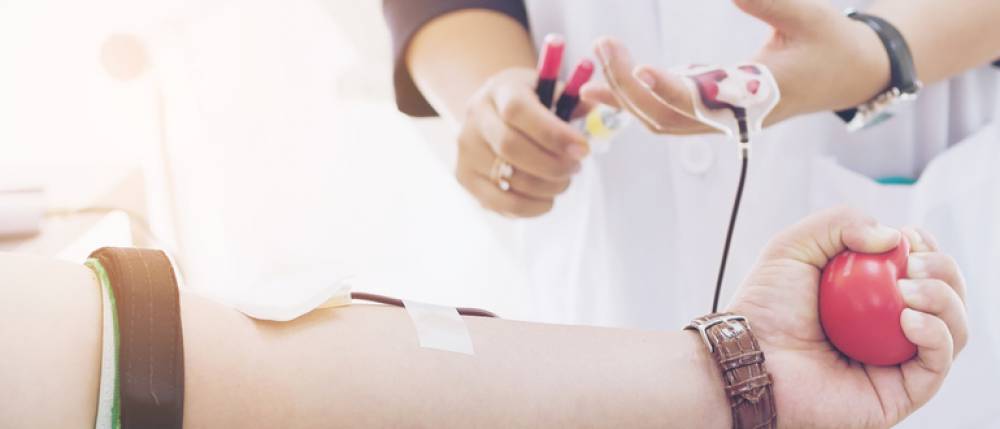Subscribe to get weekly insights
Always stay up to date with our newest articles sent direct to your inbox
Published on 25 Jul, 2022
Updated on 11 Apr, 2025
20126 Views
5 min Read

Written by Care Health Insurance
favorite1Like
Have you ever wondered if you had the power to save lives flowing through your veins? Blood donation brings this idea into existence, making regular people silent heroes. It's not only about giving your blood but hope, healing, and a second chance to live for those in need.
You offer a lifeline to patients fighting medical emergencies, severe conditions, or fatal surgeries within a few minutes. However, like any other noble deed, it's crucial to comprehend both its pros and risks.
This blog explores blood donation and unveils its life-changing benefits, including possible risks—because understanding the whole story makes your life-saving journey even more meaningful.
Stay tuned!!
Blood donation is a voluntary medical procedure in which a healthy individual donates blood to a needy patient, potentially saving lives through blood transfusions. It is crucial for treating patients who need blood due to:
Blood donation types include whole blood donation and apheresis. In whole blood donation, a pint of blood is collected, and its components are separated later. Apheresis uses a machine to separate components during the donation process.
Blood is one of the most essential parts of the body that transport oxygen from one organ to another. And most importantly one pint of blood can save up to three lives. Here are some of the major blood donation benefits:
8% of the average adult’s blood volume i.e., around 470ml of whole blood can be donated by a healthy adult aged between 18 to 75 years. The blood can be donated up to six times in a year. An adult has about 10-11 pints of blood from which about 470ml i.e., one pint can be donated for once. The blood donation can be done every eight weeks, while the platelets can be donated every seven days and up to 24 times in a year. Generally, an individual of 18 years or above age and weighs 110 pounds is eligible for blood donation.
| Aspect | Eligibility Criteria |
|---|---|
| Age | 18-65 years of age |
| Weight | The minimum weight for blood donation is 45 kg. |
| Pulse | 60 to 100 beats per minute is the required pulse for blood donation. |
| Body temperature | 98.6°F (37°C) is the normal body temperature required. |
| Hemoglobin | Up to 12.5 grams per deciliter |
| Blood pressure | 120/80 mm Hg is the range of systolic and diastolic blood pressure. |
A single blood donation usually involves donating 1 pint of blood, around 350-478 milliliters(ml). Healthy people who are 18- 65, weighing 50 kg, can donate blood. The body restocks the blood quickly within a week or two after donation. Men can donate blood after every 90 days, whereas women can donate blood after every 120 days. Each pint of donated blood helps save up to three lives, as it is split into elements like platelets, plasma, and red cells that benefit several patients.
Also check : National Blood Donor Month 2025: Significance of Blood Donation
With these well established blood donation requirements, it is also important to know the terms and conditions under which one is not eligible for the same. One can’t blood donate, if:
Here are some do’s and dont’s you should consider before blood donation:
Here are some do’s and dont’s that you should consider after blood donation:
References: https://www.crbs.net/wp-content/uploads/2017/07/Blood_Drive_Host_Info_Packet.pdf
Thyroid : मामूली नहीं हैं महिलाओं में थायराइड होना, जानें इसके लक्षण और घरेलू उपचार Vipul Tiwary in Diseases
शुगर कंट्रोल कैसे करे? जानें, डायबिटीज में क्या खाना चाहिए Vipul Tiwary in Health & Wellness
हाई ब्लड प्रेशर को तुरंत कंट्रोल कैसे करें? देखें इसके उपाय Vipul Tiwary in Diseases
पैरों में दर्द किस कमी से होता है? जानें, इसके घरेलू इलाज Vipul Tiwary in Health Insurance Articles
Neglecting Oral Health and Hygiene? Your Brain Could Suffer the Consequences Jagriti Chakraborty in Mental Health
Unlock Your Health: Protein Powder for Women and Key Supplements Jagriti Chakraborty in Diet & Nutrition
Forget Yoghurt: 8 Probiotic Foods That Actually Work Jagriti Chakraborty in Health & Wellness
BIG Update: Nipah Virus Is Back, Here’s How to Stay Safe! Sejal Singhania in Health Insurance Articles
Indeed, it is safe to donate blood as the steriles are always new, hence there is no risk of any blood-borne infection.
Drink lots of water, avoid vigorous physical activity, consume iron-rich food, and rest for at least up to 24 hours after donating blood.
One time blood donation can save up to three lives. Blood donation also helps in keeping the blood supply stable.
Yes, if travelling to malaria infected countries there are various restrictions on donating blood after travel and this may vary from country to country.
Always stay up to date with our newest articles sent direct to your inbox
Loading...